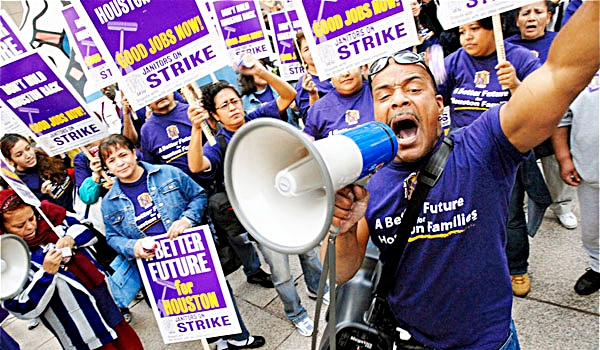SEIU uses federal inspections to target Houston small business

SEIU uses federal inspections to target Houston small business
SEEING SHADOWS: The labor union Service Employees International Union is joining the federal government on work site inspections.
By Jillian Kay Melchior | National Review
Union organizers are showing up at Occupational Safety and Health Administration inspections of an open-shop business that has been targeted by the country’s second-largest union.
Professional Janitorial Service, the largest non-union janitorial company in Houston, and the Service Employees International Union haven’t gotten along for seven years. The company currently is suing SEIU for $9 million, alleging that the union has repeatedly slandered it.
On three recent occasions, SEIU representatives accompanied federal safety inspectors to examine PJS cleaning sites, said Evelyn Meza, the human resources manager for PJS. The inspections resulted in fines.
Such an organized-labor presence on OSHA inspections at non-union businesses is becoming more commonplace, owing to a rule clarification quietly drafted in February 2013. Responding to a union inquiry, OSHA decided that third-party agents who are not affiliated with the employees or the federal government are now allowed to tag along on safety inspections. A SEIU spokesman would neither confirm nor deny the presence of union representatives on inspections and did not respond to a request for comment.
A major change, this so-called “clarification” opens up the potential for unions to use the threat of federal inspections against any business that refuses to bend to their wishes. (In the case of PJS, the SEIU wants a card-check election, which allows the union officials to see exactly who votes how, leaving employees who oppose organized representation vulnerable to intimidation, according to a source familiar with the situation.)
“Unions are very adept at using the apparatus of government to harass companies that don’t do what they like,” said James Sherk, a senior policy analyst in labor economics at the Heritage Foundation. “That’s the concern.”
Union officials accompanied OSHA inspectors to PJS cleaning sites after allegations that the company failed to give its employees required gloves and goggles, Meza said. OSHA found no such shortcomings, though according to the citation papers, it did impose at least $14,000 in proposed penalties for other infractions, including a lack of paperwork and onsite informational posters. OSHA also noted a minor training violation.
Before that, PJS had gone more than 26 years without a single OSHA write-up, according to a fact sheet issued by the company. The owner of PJS declined National Review’s request for comment. The company has 1,000 employees and $18 million in revenue, according to InsideView.com, putting it within the Small Business Administration’s definition of a small business.
Maury Baskins of Littler Mendleson, a national labor employment firm, testified to Congress on Feb. 5 about the OSHA clarificatio. He tells NRO that unions seeking to go on OSHA inspections often “have their own agenda, which is typically part of some corporate campaign to hurt the employer.”
Baskins adds that “if (OSHA) really wanted to change the rules like this, they should have done a rule-making procedure. Instead, they did it basically in secret and sprung it, and now we are seeing episodes where union agents are showing up, and most employers don’t know what to make of it and don’t know what to do.”
Brennan Bolt, an associate with McKenna Long and Aldridge who specializes in labor relations, told NRO that while the union may not be seeking to intimidate an employer, allowing union representatives to accompany OSHA inspectors gives them “an avenue to familiarize themselves with the employers’ operations or demonstrate to employees that they have some influence. . . . They can come in and at least make the appearance of (the union’s) ability to effectuate change.”
Jillian Kay Melchior writes for National Review as a Thomas L. Rhodes Fellow for the Franklin Center. She is also a senior fellow at the Independent Women’s Forum.







